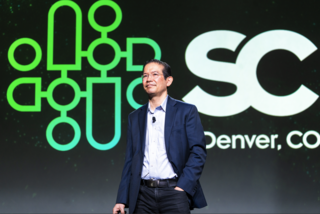
Jack Joseph Dongarra is an American computer scientist and mathematician. He is the American University Distinguished Professor of Computer Science in the Electrical Engineering and Computer Science Department at the University of Tennessee. He holds the position of a Distinguished Research Staff member in the Computer Science and Mathematics Division at Oak Ridge National Laboratory, Turing Fellowship in the School of Mathematics at the University of Manchester, and is an adjunct professor and teacher in the Computer Science Department at Rice University. He served as a faculty fellow at the Texas A&M University Institute for Advanced Study (2014–2018). Dongarra is the founding director of the Innovative Computing Laboratory at the University of Tennessee. He was the recipient of the Turing Award in 2021.
Monica Sin-Ling Lam is an American computer scientist. She is a professor in the Computer Science Department at Stanford University.
Christine L. Borgman is a distinguished Professor and Presidential Chair in Information Studies at UCLA. She is the author of more than 200 publications in the fields of information studies, computer science, and communication. Two of her sole-authored monographs, Scholarship in the Digital Age: Information, Infrastructure, and the Internet and From Gutenberg to the Global Information Infrastructure: Access to Information in a Networked World, have won the Best Information Science Book of the Year award from the American Society for Information Science and Technology. She is a lead investigator for the Center for Embedded Networked Sensing (CENS), a National Science Foundation Science and Technology Center, where she conducts data practices research. She chaired the Task Force on Cyberlearning for the NSF, whose report, Fostering Learning in the Networked World, was released in July 2008. Prof. Borgman is a Fellow of the American Association for the Advancement of Science (AAAS), a Legacy Laureate of the University of Pittsburgh, and is the 2011 recipient of the Paul Evan Peters Award from the Coalition for Networked Information, Association for Research Libraries, and EDUCAUSE. The award recognizes notable, lasting achievements in the creation and innovative use of information resources and services that advance scholarship and intellectual productivity through communication networks. She is also the 2011 recipient of the Research in Information Science Award from the American Association of Information Science and Technology. In 2013, she became a fellow of the Association for Computing Machinery.
Christopher Arthur Lattner is an American computer scientist, former Apple, Google, and Tesla employee and co-founder of LLVM, Clang compiler, MLIR compiler infrastructure and the Swift programming language. He worked as the President of Platform Engineering, SiFive after two years at Google Brain. Prior to that, he briefly served as Vice President of Autopilot Software at Tesla, Inc. and worked at Apple Inc. as Senior Director of the Developer Tools department, leading the Xcode, Instruments, and compiler teams.
Kevin J. Sullivan is an American associate professor of computer science at the University of Virginia in Charlottesville, Virginia, United States. He also holds the title of Virginia Engineering Foundation (VEF) Endowed Faculty Fellow in computer science at the University of Virginia. He is best known for his work with ultra-large-scale (ULS) systems.
Stephanie Forrest is an American computer scientist and director of the Biodesign Center for Biocomputing, Security and Society at the Biodesign Institute at Arizona State University. She was previously Distinguished Professor of Computer Science at the University of New Mexico in Albuquerque. She is best known for her work in adaptive systems, including genetic algorithms, computational immunology, biological modeling, automated software repair, and computer security.
Susan Beth Horwitz was an American computer scientist noted for her research on programming languages and software engineering, and in particular on program slicing and dataflow-analysis. She had several best paper and an impact paper award mentioned below under awards.

Kathleen Shanahan Fisher is an American computer scientist who specializes in programming languages and their implementation.

Dimitris Metaxas is a distinguished professor and the chair of the Computer Science Department at Rutgers University, where he directs the Center for Computational Biomedicine Imaging and Modeling (CBIM).

Michael Franz is an American computer scientist best known for his pioneering work on just-in-time compilation and optimisation and on artificial software diversity. He is a Distinguished Professor of Computer Science in the Donald Bren School of Information and Computer Sciences at the University of California, Irvine (UCI), a Professor of Electrical Engineering and Computer Science in the Henry Samueli School of Engineering at UCI, and Director of UCI's Secure Systems and Software Laboratory.
Heike Hofmann is a statistician and Professor in the Department of Statistics at Iowa State University.
Azer Bestavros, is the Inaugural Associate Provost for Computing and Data Sciences and the William Fairfield Warren Distinguished Professor of Computer Science at Boston University. Prior to his appointment in 2019 to lead the Faculty of Computing and Data Sciences, he was the Founding Director of The Rafik B. Hariri Institute for Computing and Computational Science & Engineering. He joined Boston University in 1991 as an assistant professor in the Department of Computer Science, which is part of the university's College of Arts & Sciences. He was promoted to the rank of associate professor in 1998 and to the rank of full professor in 2003. From 2000 to 2007, he served as chair of the Department of Computer Science. Prior to joining Boston University, he worked as an instructor, teaching fellow, software engineer, and technical consultant for various organizations and technology companies, including the Eastern Mediterranean Regional Office of World Health Organization, Awad Associates, Harvard University, and AT&T Research Laboratories.
Valerie Barr is an American computer scientist, and is the Margaret Hamilton Distinguished Professor of Computer Science at Bard College. She formerly held the Jean Sammet endowed chair in the department of Computer Science at Mount Holyoke College in South Hadley, Massachusetts. She is known for her work with women in computing.
Sarah Ann Douglas is a distinguished computer scientist, known for her work in human-computer interaction (HCI), a field of computer science that she has helped pioneer, and, in particular, pointing devices and haptic interactions, WWW interfaces and bioinformatics, and visualization and visual interfaces. She is a Professor Emerita of Computer and Information Science and a member of the Computational Science Institute at the University of Oregon.

Jacob O. Wobbrock is a Professor in the University of Washington Information School and, by courtesy, in the Paul G. Allen School of Computer Science & Engineering at the University of Washington. He is Director of the ACE Lab, Associate Director and founding Co-Director Emeritus of the CREATE research center, and a founding member of the DUB Group and the MHCI+D degree program.
Latifur Khan joined the University of Texas at Dallas in 2000, where he has been conducting research and teaching as a Professor in the Department of Computer Science.

Frederic (Fred) T. Chong is an American computer scientist known for research in computer architecture, quantum computing, and computer security.

Raheem Beyah is an American computer engineer, researcher, and educator. As of January 15, 2021 he is the Dean of the College of Engineering and Southern Company Chair at the Georgia Institute of Technology. Prior to becoming the Dean, he was the vice president for Interdisciplinary Research and the Motorola Foundation Professor and the executive director of Georgia Tech's online masters in cyber security program. Beyah is also the co-founder and chair of industrial security company Fortiphyd Logic, Inc.

Yannis Smaragdakis is a Greek-American software engineer, computer programmer, and researcher. He is a professor in the Department of Informatics and Telecommunications at the University of Athens. He is the author of more than 130 research articles on a variety of topics, including program analysis, declarative languages, program generators, language design, and concurrency. He is best known for work in program generation and program analysis and the Doop framework.
Jessica Hullman is a computer scientist and the Ginni Rometty associate professor of Computer Science at Northwestern University. She is known for her research in Information visualization.








